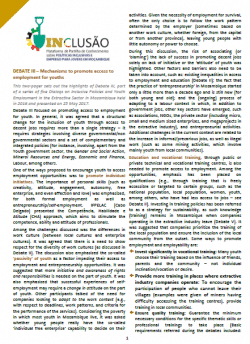
This two-pager provides highlights of a debate on mechanisms to promote access to employment for youths, part of a series of five dialogs on inclusive policies and youth employment in the extractive sector in Mozambique held through 2016 and presented in a national workshop on 25 May 2017.
Highlights on promoting access to employment for youth
- Promote individual initiatives though skills development for both formal employment as well as entrepreneurship/self-employment.
- More initiative and awareness of rights and responsibilities is needed on the part of youth.
- Education and vocational training, through public or private technical and vocational training centres, is also needed to promote access to employment.
Strategies to promote employment and employability
- Invest significantly in vocational training
- Provide more training in places where extractive industry companies operate
- Ensure quality training
- Provide post-training follow-up
- Pre-professional apprenticeships
- Finalise and implement ongoing government policies and public funds, including for community associations such as employment centres and technical-professional training
- Options for strategies-once-off support, strategies for structural change, Universal policies and/or affirmative action/positive discrimination
- There is a need to collect data on employment information g., on the labour market, available jobs, and young candidates looking for jobs for evidence based interventions.









